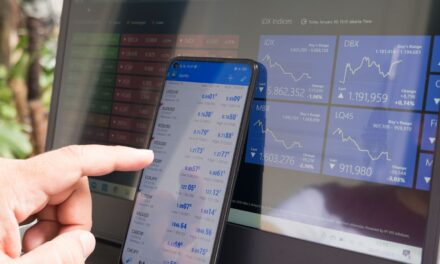Introduction
Forex trading in India is becoming increasingly popular as more and more investors are looking to take advantage of the potential profits that can be made from trading in the foreign exchange market. India is one of the world’s largest economies and has a large population of investors who are looking to diversify their portfolios and take advantage of the potential profits that can be made from trading in the foreign exchange market. With the right knowledge and tools, investors can take advantage of the opportunities that the forex market offers and make a profit. In this article, we will discuss the basics of forex trading in India, the regulations that govern it, and the potential risks and rewards associated with it.
How to Get Started with Forex Trading in India
Forex trading is a popular form of investment in India, and it can be a great way to make money. However, it is important to understand the risks associated with this type of trading before getting started.
The first step to getting started with forex trading in India is to find a reliable broker. Many brokers are available in India, and it is important to do your research to find one that is reputable and trustworthy. You should also make sure that the broker is regulated by the Securities and Exchange Board of India (SEBI).
Once you have chosen a broker, you will need to open a trading account. This account will be used to place trades and manage your funds. You will also need to deposit money into the account in order to start trading.
Once you have opened an account, you will need to learn the basics of forex trading. This includes understanding the different types of currencies, how to read charts, and how to interpret news and economic data. You should also familiarize yourself with the different types of orders, such as stop-loss and take-profit orders.
Once you have a good understanding of the basics, you can start trading. It is important to remember that forex trading is a high-risk activity, and you should only invest money that you can afford to lose. You should also be aware of the risks associated with leverage, which can lead to large losses if not managed properly.
Finally, it is important to keep up to date with the latest news and economic data. This will help you make informed decisions when trading.
Forex trading can be a great way to make money, but it is important to understand the risks associated with it before getting started. By doing your research and learning the basics, you can get started with forex trading in India and start making money.
Understanding the Indian Forex Market
The Indian Forex market is one of the most dynamic and rapidly growing markets in the world. It is the largest and most liquid financial market in India, with a daily turnover of over US$2 trillion. The Indian Forex market is highly regulated by the Reserve Bank of India (RBI) and is open to both domestic and foreign investors.
The Indian Forex market is divided into two main segments: the interbank market and the retail market. The interbank market is the largest and most liquid segment of the Indian Forex market, accounting for more than 90% of the total daily turnover. It is a network of banks, financial institutions, and other market participants that trade currencies among themselves. The retail market, on the other hand, is made up of individual investors and traders who buy and sell currencies through brokers and dealers.
The Indian Forex market is open 24 hours a day, five days a week. It is open from 9:00 am to 5:00 pm Indian Standard Time (IST) on weekdays, and from 9:00 am to 1:00 pm IST on Saturdays. The Indian Forex market is highly volatile and is subject to sudden and large price movements. This makes it a risky investment, and investors should be aware of the risks involved before investing.
The Indian Forex market is also subject to various regulations and restrictions imposed by the RBI. These regulations are designed to protect investors and ensure the stability of the Indian Forex market. For example, the RBI has imposed limits on the amount of leverage that can be used by investors in the Indian Forex market.
The Indian Forex market is an attractive investment option for investors looking to diversify their portfolios and take advantage of the potential for high returns. However, it is important to understand the risks involved and to be aware of the regulations imposed by the RBI before investing.
Is Forex Trading Allowed in India?
Forex trading is the exchange of one currency for another. It is one of the most actively traded markets in the world, with an average daily trading volume of $5 trillion. In India, Forex trading is legal and regulated by the Securities and Exchange Board of India (SEBI).
SEBI regulates all the brokers operating in India and ensures that all the brokers adhere to the regulations set by the government. SEBI also ensures that all brokers provide a secure and transparent trading environment to their clients.
In India, Forex trading is allowed in all major currency pairs, including the US Dollar, Euro, British Pound, Japanese Yen, and Swiss Franc. However, trading in exotic currency pairs is not allowed.
In order to start trading in Forex, you need to open a trading account with a broker. You can open a trading account with any of the SEBI-regulated brokers in India. Once you have opened a trading account, you can start trading in Forex.
It is important to note that Forex trading is a high-risk investment and you should only invest money that you can afford to lose. You should also make sure that you understand the risks associated with Forex trading before you start trading.
What are the Restrictions of Forex Trading in India?
Forex trading in India is subject to certain restrictions imposed by the Reserve Bank of India (RBI). These restrictions are in place to protect investors and ensure that the Indian rupee remains stable.
The first restriction is that all forex trading must be done through authorized dealers. This means that individuals cannot trade directly with foreign brokers. All transactions must be conducted through a registered broker in India.
The second restriction is that all forex trading must be done in Indian rupees. This means that traders cannot use foreign currencies to buy or sell Indian rupees.
The third restriction is that all forex trading must be done within the limits set by the RBI. This means that traders cannot buy or sell more than the prescribed limit of foreign currency.
The fourth restriction is that all forex trading must be done through a bank account. This means that traders cannot use cash or other payment methods to buy or sell foreign currency.
Finally, the fifth restriction is that all forex trading must be done within the country. This means that traders cannot use foreign brokers or trade in foreign markets.
These restrictions are in place to protect investors and ensure that the Indian rupee remains stable. It is important for traders to understand and abide by these restrictions in order to ensure a safe and secure trading environment.
Tips for Choosing the Right Forex Broker in India
1. Check the Broker’s Regulatory Status: Before selecting a Forex broker in India, it is important to check the broker’s regulatory status. The broker should be registered with the Securities and Exchange Board of India (SEBI) and should be a member of the National Stock Exchange (NSE) or the Bombay Stock Exchange (BSE).
2. Consider the Broker’s Reputation: It is important to consider the reputation of the Forex broker in India. Check the broker’s reviews and ratings online to get an idea of the broker’s reliability and customer service.
3. Compare Fees and Charges: Different Forex brokers in India charge different fees and charges. Compare the fees and charges of different brokers to find the one that offers the best value for money.
4. Look for Trading Platforms: Different Forex brokers in India offer different trading platforms. Choose a broker that offers a trading platform that is easy to use and has all the features you need.
5. Check the Leverage Offered: Different Forex brokers in India offer different levels of leverage. Choose a broker that offers the leverage you need to trade effectively.
6. Consider Customer Support: Good customer support is essential for successful Forex trading. Choose a broker that offers 24/7 customer support and has a good track record of responding to customer queries quickly.
Strategies for Successful Forex Trading in India
Forex trading in India is becoming increasingly popular as more and more investors are looking to capitalize on the potential profits that can be made in the foreign exchange market. However, it is important to understand that trading in the forex market is not without its risks and it is essential to have a sound strategy in place in order to maximize your chances of success. Here are some strategies for successful forex trading in India:
1. Develop a Trading Plan: Before you start trading, it is important to develop a trading plan that outlines your goals, risk tolerance, and strategies. This plan should include the type of currency pairs you plan to trade, the amount of capital you are willing to risk, and the timeframe for your trades.
2. Research the Market: It is essential to have a good understanding of the forex market before you start trading. Research the different currency pairs, their trends, and the factors that influence their prices. This will help you make informed decisions when trading.
3. Use Risk Management Strategies: Risk management is an important part of successful forex trading. Make sure to use stop-loss orders and other risk management strategies to limit your losses and protect your capital.
4. Utilize Technical Analysis: Technical analysis is a powerful tool for forex traders. Utilize technical indicators such as moving averages, support and resistance levels, and chart patterns to identify potential trading opportunities.
5. Monitor Your Trades: It is important to monitor your trades and adjust your strategies as needed. Keep track of your profits and losses and make sure to adjust your strategies if they are not working.
By following these strategies, you can increase your chances of success in forex trading in India. However, it is important to remember that trading in the forex market is risky and you should never invest more than you can afford to lose.
Exploring the Benefits of Forex Trading in India
Forex trading in India has become increasingly popular in recent years, as more and more investors are looking to take advantage of the potential benefits it offers. Forex trading, or foreign exchange trading, is the buying and selling of currencies on the foreign exchange market. It is a global market, with traders from all over the world participating in it.
The primary benefit of forex trading in India is the potential for high returns. The foreign exchange market is highly liquid, meaning that traders can enter and exit positions quickly and easily. This allows traders to take advantage of short-term price movements and capitalize on them for profit. Additionally, the foreign exchange market is open 24 hours a day, five days a week, allowing traders to take advantage of market movements at any time.
Another benefit of forex trading in India is the low cost of entry. Unlike other forms of trading, such as stocks and commodities, forex trading does not require a large amount of capital to get started. This makes it an attractive option for those who are just starting out in the world of trading. Additionally, the cost of trading is relatively low, as there are no commissions or fees associated with trading.
Finally, forex trading in India is highly accessible. With the advent of online trading platforms, traders can access the foreign exchange market from anywhere in the world. This makes it easy for traders to stay up to date with the latest market news and trends, and to take advantage of opportunities as they arise.
Overall, forex trading in India offers a number of potential benefits for investors. With its low cost of entry, high liquidity, and 24-hour access, it is an attractive option for those looking to take advantage of the potential returns it offers.
The Risks of Forex Trading in India
Forex trading in India is a relatively new concept and has gained immense popularity in recent years. However, it is important to understand that forex trading carries a high degree of risk and is not suitable for all investors. Before engaging in forex trading, it is important to understand the risks associated with it.
The first risk associated with forex trading in India is the lack of regulation. The Indian government does not regulate forex trading, which means that there is no legal protection for investors. This means that investors are exposed to the risk of fraud and manipulation. Additionally, there is no guarantee that the broker you are trading with is legitimate and trustworthy.
The second risk associated with forex trading in India is the lack of liquidity. The Indian forex market is relatively small compared to other markets, which means that it can be difficult to find buyers and sellers. This can lead to wide spreads and high transaction costs, which can significantly reduce your profits.
The third risk associated with forex trading in India is the lack of transparency. The Indian forex market is largely unregulated, which means that there is no way to verify the accuracy of the prices quoted by brokers. This can lead to price manipulation and other unethical practices.
Finally, forex trading in India is subject to currency risk. The Indian rupee is subject to fluctuations in the global currency markets, which can lead to significant losses if the rupee depreciates against other currencies.
In conclusion, forex trading in India carries a high degree of risk and is not suitable for all investors. It is important to understand the risks associated with forex trading before engaging in it. Additionally, it is important to ensure that you are trading with a legitimate and trustworthy broker.
Conclusion
In conclusion, Forex trading in India is a viable option for those looking to diversify their investment portfolio. With the right knowledge and tools, traders can take advantage of the many opportunities available in the Indian forex market. However, it is important to remember that forex trading carries a high degree of risk and should only be undertaken with caution. It is also important to ensure that you are trading with a regulated broker and that you understand the risks associated with trading.










